Video Link: https://vimeo.com/293631145
Video Download: Click Here To Download Video
Video Stream: Click Here To Stream Video
Video Link: https://vimeo.com/293631838
Video Download: Click Here To Download Video
Video Stream: Click Here To Stream Video
For perhaps all of history, the pleasures that we derive from both food and sex have been intertwined. There's always been a sort of magic regarding how the  two pleasures interact. Perhaps some of this connection is a result of our cultural traditions and the placebo effect, but there is more and more evidence that many foods honestly and truly have a physiological effect upon the body which affects sexual drive or performance.
two pleasures interact. Perhaps some of this connection is a result of our cultural traditions and the placebo effect, but there is more and more evidence that many foods honestly and truly have a physiological effect upon the body which affects sexual drive or performance.
Many foods have been linked to increased libido and sexual ability, but there are also many foods that have a suppressive effect on these desires, and the foods that you eat could actually be a significant factor in your lack of desire for sex and intimacy.
What Controls Sex Drive?
There are a lot of different influences which impact our libido and our desire for intimate contact, as well as our ability to perform in the bedroom. Many of these influences are psychological or interpersonal, but our hormone balance and function also plays a vital role and is the physiological spark that activates our desire.
The most critical hormone about sexual desire and libido is Testosterone. This is actually true of both sexes, men and women. Women don't produce as much of the hormone as men, but they still need the hormone to generate sexual desire  and readiness. If your body isn't producing enough Testosterone, this is going to impact your libido directly.
and readiness. If your body isn't producing enough Testosterone, this is going to impact your libido directly.
This is actually the scientific basis which still supports the age-old concept of the aphrodisiac, although evidence is unclear regarding which foods genuinely have this ability, or to what extent the influence of these foods has on libido. The concept of aphrodisiacs is simple—some foods, when consumed, can increase your desire for passion and romance.
Some Foods have Both Testosterone Promoting and Inhibiting Properties
Of course, many foods represent a double-edged sword about sex drive. For example, chocolate is widely considered to be an aphrodisiac which promotes intimacy and romance. The chemical hypothesis for this connection is that chocolate contains an ingredient known as phenethylamine, which, like oxytocin, is physiologically correlated with the feeling of love. On the other hand, Chocolate also has a suppressive effect on Testosterone when enjoyed to excess, which very obviously can reduce desire and libido.
There are a lot of foods that can mess with your body's ability to produce  Testosterone, including chocolate, processed carbohydrates, yogurt, cheese, and alcohol. All of these food promotes the activity of an enzyme known as aromatase, which can take the Testosterone in your bloodstream and convert it into Estrogen. This is bad for your libido and, for men, bad for the heart. The male body needs some Estrogen, but if it has too much, it can significantly increase the risk of cardiovascular conditions such as cardiovascular disease, hypertension, and diabetes, in addition to hindering sexual performance and desire.
Testosterone, including chocolate, processed carbohydrates, yogurt, cheese, and alcohol. All of these food promotes the activity of an enzyme known as aromatase, which can take the Testosterone in your bloodstream and convert it into Estrogen. This is bad for your libido and, for men, bad for the heart. The male body needs some Estrogen, but if it has too much, it can significantly increase the risk of cardiovascular conditions such as cardiovascular disease, hypertension, and diabetes, in addition to hindering sexual performance and desire.
Of course, if your libido is healthy and you enjoy a sensible diet, there's no shame in enjoying these indulgences, but if you lean on these foods too much, you'll likely start to feel these changes both in your gut and in the bedroom.
A good rule of thumb, if you are looking to encourage a healthier sex drive by improving your diet, is only to eat foods that can suppress your sex drive no more than five times weekly. This will help defeat the activity of aromatase in the body and potentially increase your sex drive. Although these same tips can help women, men appear to be much more prone to changes in libido directly associated with food and drink.
The following are eleven foods that scientific research suggests can potentially sink your sex drive:
Cheese and Testosterone
Cheese is a mixed bag when it comes to Testosterone. There is evidence that certain cheeses, especially hard cheeses, can promote the production of Testosterone via healthy fat, as well as a protein known as lysine. On the other hand, if you eat cheese that comes from animals that have been heavily treated with hormones to maximize dairy production, you could be consuming byproducts of those hormone products which could suppress your production of Testosterone in favor of Estrogen. The best way to get the most out of your cheese is to source your cheese from animals that have not been treated with synthetic hormones.
with hormones to maximize dairy production, you could be consuming byproducts of those hormone products which could suppress your production of Testosterone in favor of Estrogen. The best way to get the most out of your cheese is to source your cheese from animals that have not been treated with synthetic hormones.
Mint and Testosterone
There is clinical evidence that mint can alter Testosterone production. For example, research has shown that eating peppermint or smoking menthol cigarettes both suppress the level of Free Testosterone in the bloodstream. Your Free Testosterone Levels are a direct indicator of the level of the hormone available for use by the body and is the most potent sign of Testosterone Deficiency.
Simple Carbohydrates and Testosterone
Simple carbohydrates are carbohydrate products like white bread and white rice, which have been processed to the point at which their nutritional content and 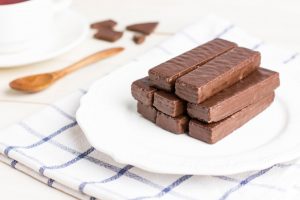 structural complexity have been significantly broken down. This means that, when you eat simple carbs, your body has to do little to no work to break the energy inside, which leads to significant fluctuations in blood sugar that can significantly impact the balance of Testosterone, Human Growth Hormone, and Insulin. The end result is that you put on the pounds, lose your energy, and lose your interest in sex, in addition to increasing your risk of diabetes.
structural complexity have been significantly broken down. This means that, when you eat simple carbs, your body has to do little to no work to break the energy inside, which leads to significant fluctuations in blood sugar that can significantly impact the balance of Testosterone, Human Growth Hormone, and Insulin. The end result is that you put on the pounds, lose your energy, and lose your interest in sex, in addition to increasing your risk of diabetes.
Coffee and Sex Drive
Coffee is another example of something that can both promote and inhibit healthy sexual activity. For instance, if you are feeling a bit tired and worn out, a  cup of coffee can perk you up an increase in your energy for healthy sex. On the other hand, if you drink too much coffee or drink it too often, you can experience issues related to anxiety or even adrenal fatigue, which saps your body's capacity to produce Testosterone in exchange for the production of Cortisol. People with caffeine sensitivity are most at risk of experiencing loss of libido from caffeine consumption.
cup of coffee can perk you up an increase in your energy for healthy sex. On the other hand, if you drink too much coffee or drink it too often, you can experience issues related to anxiety or even adrenal fatigue, which saps your body's capacity to produce Testosterone in exchange for the production of Cortisol. People with caffeine sensitivity are most at risk of experiencing loss of libido from caffeine consumption.
Chocolate and Sex Drive
Chocolate can be a useful tool to increase sex drive, but depending on how you fulfill your cravings, you could be doing yourself a disservice. The 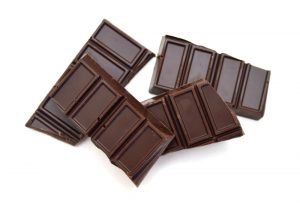 consumption of dark chocolate has been linked to improved Testosterone Levels and libido. Still, most Americans eat milk chocolate, which is heavily laced with simple sugars and milk which can suppress the benefits of the chocolate, and if you overeat, can contribute to weight gain and reduced Testosterone concentrations in the bloodstream.
consumption of dark chocolate has been linked to improved Testosterone Levels and libido. Still, most Americans eat milk chocolate, which is heavily laced with simple sugars and milk which can suppress the benefits of the chocolate, and if you overeat, can contribute to weight gain and reduced Testosterone concentrations in the bloodstream.
Microwave Popcorn
Popcorn can be a fantastic snack, but to get the most out of the food with the fewest drawbacks, you should cook your popcorn on the stove in a bit of heart-healthy oil, or, better yet, air pop your popcorn. Microwaved popcorn can harm both your Testosterone Levels and your libido because the 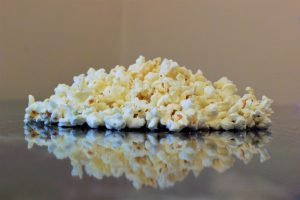 inside of the bag is covered with a chemical liner known as perfluorooctanoic acid, which is a Phthalate compound which has been scientifically proven to inhibit Testosterone Levels. This chemical can leach into the popcorn itself in low concentrations, and the more you are exposed to these compounds, the more you put your hormone health, as well as your prostate health, at risk.
inside of the bag is covered with a chemical liner known as perfluorooctanoic acid, which is a Phthalate compound which has been scientifically proven to inhibit Testosterone Levels. This chemical can leach into the popcorn itself in low concentrations, and the more you are exposed to these compounds, the more you put your hormone health, as well as your prostate health, at risk.
Diet Soda and Libido
Many men and women use diet drinks as a means to cut the calories that they consume each day. With the amount of soda that the average American consumes 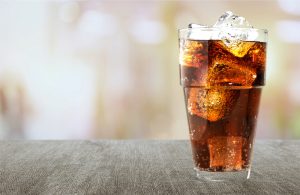 each day, it's clear that many people can lose weight with the help of these diet drinks, even when taking into account the fact that diet drinks make many people prone to overeating. The problem with diet drinks concerning libido is that they can have an impact on psychological balance, especially if you drink a whole lot of it. In particular, aspartame and its close relatives interact with your body's production and metabolism of serotonin, a hormone that promotes feelings of happiness and wards off anxiety and depression.
each day, it's clear that many people can lose weight with the help of these diet drinks, even when taking into account the fact that diet drinks make many people prone to overeating. The problem with diet drinks concerning libido is that they can have an impact on psychological balance, especially if you drink a whole lot of it. In particular, aspartame and its close relatives interact with your body's production and metabolism of serotonin, a hormone that promotes feelings of happiness and wards off anxiety and depression.
Licorice and Libido
Licorice isn't bad in moderation, but if you are a big fan of the candy, or you are having issues with libido or Testosterone Levels, you should limit your 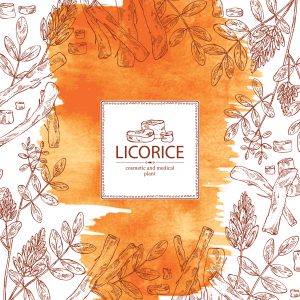 consumption of this guilty pleasure. Licorice contains glycyrrhizin, an enzyme that suppresses Testosterone Concentrations in the bloodstream, which can inhibit your sex drive. One study even showed that eating licorice for four straight days could drop Testosterone production by as much as forty percent! It appears that the impact of glycyrrhizin on Testosterone is mainly dependent upon individual sensitivities, however.
consumption of this guilty pleasure. Licorice contains glycyrrhizin, an enzyme that suppresses Testosterone Concentrations in the bloodstream, which can inhibit your sex drive. One study even showed that eating licorice for four straight days could drop Testosterone production by as much as forty percent! It appears that the impact of glycyrrhizin on Testosterone is mainly dependent upon individual sensitivities, however.
Soy and Libido
This news is starting to become more widespread, but soy has severe 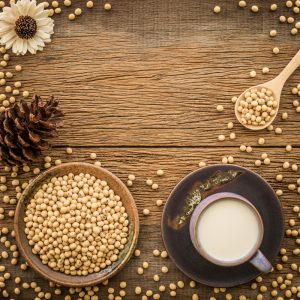 aromatizing effects, and can directly convert Testosterone into Estrogen. Many men report that going vegan, and relying on soy for protein, significantly reduced their desire for sex, to the point where they stopped using soy altogether. On top of that, research has shown that too much soy can affect Testosterone Levels so significantly that it can lead to temporary erectile dysfunction!
aromatizing effects, and can directly convert Testosterone into Estrogen. Many men report that going vegan, and relying on soy for protein, significantly reduced their desire for sex, to the point where they stopped using soy altogether. On top of that, research has shown that too much soy can affect Testosterone Levels so significantly that it can lead to temporary erectile dysfunction!
Hydrogenated Fats, Trans-Fats, and Libido
The body uses fat and cholesterol to produce Testosterone, but the critical type of fat that the body needs for this process is Saturated Fat. Both Hydrogenated fats and Trans-Fats have the opposite effect and can drain libido and sex drive. 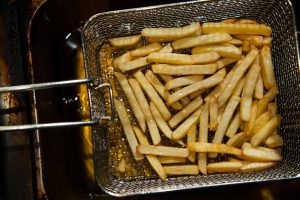 Trans-Fats do not occur in nature and are the result of significant chemical processing. If you are interested in boosting your sex drive, go for saturated, heart-healthy fats. This is good for your heart and cardiovascular system as well, as long as you don't overdo it!
Trans-Fats do not occur in nature and are the result of significant chemical processing. If you are interested in boosting your sex drive, go for saturated, heart-healthy fats. This is good for your heart and cardiovascular system as well, as long as you don't overdo it!
Alcohol and Libido
It's true that alcohol does encourage sexual activity in many ways. In lowers inhibition and makes it easier to relax. The temporary suppression of serotonin  also promotes the expression of sexual desire. In the end, though, Alcohol is another compound that supports the conversion of Testosterone into Estrogen, and men that drink too much have issues with Erectile Dysfunction and lack of libido, which limits their ability to engage in healthy sexual activity. Frequent use of alcohol can also exacerbate depression, which is partially the result of inhibited Serotonin activity.
also promotes the expression of sexual desire. In the end, though, Alcohol is another compound that supports the conversion of Testosterone into Estrogen, and men that drink too much have issues with Erectile Dysfunction and lack of libido, which limits their ability to engage in healthy sexual activity. Frequent use of alcohol can also exacerbate depression, which is partially the result of inhibited Serotonin activity.
Contact Us Today For A Free Consultation

- Adverse Effects of Testosterone Therapy in Adult Men: A Systematic Review and Meta-Analysis [Last Updated On: July 2nd, 2024] [Originally Added On: June 4th, 2010]
- Low Testosterone Levels, Foods That Increase Testosterone Levels wwwSelf-Improvement-Bible.com [Last Updated On: November 12th, 2023] [Originally Added On: May 30th, 2011]
- Low Testosterone in Men: The Next Big Thing in Medicine! - Abraham Morgentaler, MD [Last Updated On: May 7th, 2023] [Originally Added On: June 3rd, 2011]
- How To Determine Testosterone Levels By Looking At Your Ring Finger [Last Updated On: December 7th, 2017] [Originally Added On: June 30th, 2011]
- Prolab Horny Goat Weed Testosterone Booster Supplement Review [Last Updated On: November 23rd, 2023] [Originally Added On: July 19th, 2011]
- The Healthy Skeptic: Products make testosterone claims [Last Updated On: August 13th, 2024] [Originally Added On: September 11th, 2011]
- How To Naturally Increase Testosterone [Last Updated On: November 21st, 2023] [Originally Added On: September 28th, 2011]
- Testosterone Production - Video [Last Updated On: November 25th, 2024] [Originally Added On: November 20th, 2011]
- Testosterone makes us less cooperative and more egocentric, study finds [Last Updated On: January 23rd, 2018] [Originally Added On: February 1st, 2012]
- Testosterone makes us less cooperative and more egocentric [Last Updated On: January 24th, 2018] [Originally Added On: February 1st, 2012]
- Too much testosterone makes for bad decisions, tests show [Last Updated On: April 30th, 2025] [Originally Added On: February 1st, 2012]
- Today in Research: Testosterone's Negative Effects; Diet Soda Death [Last Updated On: January 2nd, 2018] [Originally Added On: February 2nd, 2012]
- Testosterone drives ego, trips cooperation [Last Updated On: December 2nd, 2017] [Originally Added On: February 4th, 2012]
- FDA approves BioSante/Teva's testosterone gel [Last Updated On: April 28th, 2025] [Originally Added On: February 15th, 2012]
- 'Manly' Fingers Make For Strong Jawline in Young Boys [Last Updated On: December 1st, 2017] [Originally Added On: February 15th, 2012]
- Teva, BioSante Win U.S. Approval for Testosterone Therapy [Last Updated On: December 10th, 2017] [Originally Added On: February 15th, 2012]
- BioSante Gains on Approval of Testosterone Gel: Chicago Mover [Last Updated On: January 8th, 2018] [Originally Added On: February 16th, 2012]
- BioSante soars following drug approval from FDA [Last Updated On: December 26th, 2017] [Originally Added On: February 16th, 2012]
- Antibodies, Not Hard Bodies: The Real Reason Women Drool Over Brad Pitt [Last Updated On: December 24th, 2017] [Originally Added On: February 21st, 2012]
- Almark Publishing Releases Book From Mark Rosenberg, M.D. Revealing Natural Discoveries Associated With Low ... [Last Updated On: May 3rd, 2025] [Originally Added On: February 28th, 2012]
- Testosterone Replacement Clinic Comes to Kansas City with Potential to Help Thousands of Men [Last Updated On: May 2nd, 2025] [Originally Added On: March 1st, 2012]
- Study examines the relative roles of testosterone and its metabolite, dihydrotestosterone in men [Last Updated On: December 2nd, 2017] [Originally Added On: March 7th, 2012]
- The Role of 5{alpha}-Reductase Inhibition in Men Receiving Testosterone Replacement Therapy [Editorial] [Last Updated On: December 21st, 2017] [Originally Added On: March 7th, 2012]
- Effect of Testosterone Supplementation With and Without a Dual 5{alpha}-Reductase Inhibitor on Fat-Free Mass in Men ... [Last Updated On: January 3rd, 2018] [Originally Added On: March 7th, 2012]
- Why We Like Men Who Can Keep Their Cool [Last Updated On: December 30th, 2017] [Originally Added On: March 7th, 2012]
- Testosterone And Heart Health [Last Updated On: May 1st, 2025] [Originally Added On: March 10th, 2012]
- Your Life on Testosterone: Overly Sure of Yourself, Unwilling to Listen [Last Updated On: November 25th, 2018] [Originally Added On: March 15th, 2012]
- Mayo Clinic-TGen study role testosterone may play in triple negative breast cancer [Last Updated On: December 8th, 2017] [Originally Added On: March 23rd, 2012]
- A dose of testosterone might not cure what ails you [Last Updated On: January 23rd, 2018] [Originally Added On: March 25th, 2012]
- Green tea could aid athletes hide testosterone doping [Last Updated On: December 16th, 2017] [Originally Added On: March 25th, 2012]
- TGen Study Role Testosterone May Play in Triple Negative Breast Cancer [Last Updated On: December 6th, 2017] [Originally Added On: March 26th, 2012]
- Testosterone low, but responsive to competition, in Amazonian tribe [Last Updated On: January 23rd, 2018] [Originally Added On: March 28th, 2012]
- Competition-linked bursts of testosterone are fundamental aspect of human biology, study of Amazonian tribe suggests [Last Updated On: December 25th, 2017] [Originally Added On: March 28th, 2012]
- Playing football boosts testosterone levels by 30 percent! [Last Updated On: February 4th, 2024] [Originally Added On: March 28th, 2012]
- Testosterone low, but responsive to competition, in Amazonian tribe -- with slideshow [Last Updated On: December 9th, 2017] [Originally Added On: March 28th, 2012]
- The benefits of testosterone pellet therapy [Last Updated On: January 24th, 2018] [Originally Added On: March 29th, 2012]
- Low testosterone levels cause health woes [Last Updated On: November 25th, 2018] [Originally Added On: March 30th, 2012]
- Heart Failure Patients Getting Relief from Testosterone Supplements [Last Updated On: May 5th, 2025] [Originally Added On: April 21st, 2012]
- Study Finds Fatherhood Suppresses Testosterone [Last Updated On: May 4th, 2025] [Originally Added On: May 3rd, 2012]
- Low testosterone levels could raise diabetes risk for men [Last Updated On: January 26th, 2018] [Originally Added On: May 5th, 2012]
- Why low testosterone may increase your risk of diabetes [Last Updated On: November 25th, 2024] [Originally Added On: May 5th, 2012]
- Diabetes link to low testosterone [Last Updated On: November 25th, 2024] [Originally Added On: May 5th, 2012]
- Testosterone Linked to Weight Loss in Obese Men [Last Updated On: January 2nd, 2018] [Originally Added On: May 11th, 2012]
- Testosterone may help weight loss [Last Updated On: November 25th, 2024] [Originally Added On: May 11th, 2012]
- Testosterone-fuelled infantile males might be a product of Mom's behaviour [Last Updated On: December 25th, 2017] [Originally Added On: May 11th, 2012]
- Testosterone-fueled infantile males might be a product of Mom's behavior [Last Updated On: January 6th, 2018] [Originally Added On: May 11th, 2012]
- Testosterone supplements may help obese men lose weight [Last Updated On: January 5th, 2018] [Originally Added On: May 11th, 2012]
- Testosterone supplements 'can help men lose their middle-aged spread' [Last Updated On: November 25th, 2024] [Originally Added On: May 12th, 2012]
- Some doctors question safety of testosterone replacement therapy [Last Updated On: January 20th, 2018] [Originally Added On: May 15th, 2012]
- Health Canada Approves New Testosterone Topical Solution for Men [Last Updated On: May 15th, 2025] [Originally Added On: May 15th, 2012]
- Environment trumps genes in testosterone levels, study finds [Last Updated On: May 8th, 2025] [Originally Added On: May 15th, 2012]
- Global Testosterone Replacement Therapy (TRT) Industry [Last Updated On: May 7th, 2025] [Originally Added On: May 21st, 2012]
- Testosterone Fuels Boom, Swindler Sows Panic: Top Business Books [Last Updated On: January 13th, 2018] [Originally Added On: June 2nd, 2012]
- Increase in testosterone drug use [Last Updated On: April 12th, 2018] [Originally Added On: June 4th, 2012]
- Testosterone Promotes Agression Automatically [Last Updated On: January 29th, 2018] [Originally Added On: June 9th, 2012]
- Testosterone shown to help sexually frustrated women [Last Updated On: January 27th, 2018] [Originally Added On: June 9th, 2012]
- Research and Markets: Testosterone Replacement Therapy (TRT) - Global Strategic Business Report [Last Updated On: December 23rd, 2017] [Originally Added On: June 12th, 2012]
- Proposed testosterone testing of some female olympians challenged by Stanford scientists [Last Updated On: January 30th, 2018] [Originally Added On: June 14th, 2012]
- Testosterone Makes Bosses Into Jerks, Says Paul Zak [Last Updated On: January 8th, 2018] [Originally Added On: June 14th, 2012]
- Testosterone Therapy: A Misguided Approach to Erectile Dysfunction (ED) [Last Updated On: May 10th, 2025] [Originally Added On: June 20th, 2012]
- New drugs, new ways to target androgens in prostate cancer therapy [Last Updated On: January 8th, 2018] [Originally Added On: June 20th, 2012]
- Long-term testosterone treatment for men results in reduced weight and waist size [Last Updated On: January 19th, 2018] [Originally Added On: June 23rd, 2012]
- Declining testosterone levels in men not part of normal aging, study finds [Last Updated On: December 27th, 2017] [Originally Added On: June 23rd, 2012]
- Low testosterone not normal part of aging [Last Updated On: December 22nd, 2017] [Originally Added On: June 25th, 2012]
- Testosterone Does Not Necessarily Wane With Age [Last Updated On: December 6th, 2017] [Originally Added On: June 25th, 2012]
- Overweight men can boost low testosterone levels by losing weight [Last Updated On: December 10th, 2017] [Originally Added On: June 25th, 2012]
- Testosterone-replacement therapy improves symptoms of metabolic syndrome [Last Updated On: January 14th, 2018] [Originally Added On: June 26th, 2012]
- Testosterone therapy takes off pounds [Last Updated On: December 11th, 2017] [Originally Added On: June 26th, 2012]
- Weight loss may boost men's testosterone [Last Updated On: May 9th, 2025] [Originally Added On: June 27th, 2012]
- Low Testosterone? Study finds age may not be to blame [Last Updated On: May 12th, 2025] [Originally Added On: July 1st, 2012]
- Do you have low testosterone? [Last Updated On: December 15th, 2017] [Originally Added On: July 8th, 2012]
- Wall Streeters Buying Testosterone for an Edge [Last Updated On: May 11th, 2025] [Originally Added On: July 12th, 2012]
- Beefy Wall Street Traders rub on testosterone [Last Updated On: February 20th, 2024] [Originally Added On: July 12th, 2012]
- Tale of two runners exposes flawed Olympic thinking [Last Updated On: December 23rd, 2024] [Originally Added On: July 19th, 2012]
- Genetic markers for testosterone and estrogen level regulation identified [Last Updated On: January 6th, 2018] [Originally Added On: July 20th, 2012]
- BUSM researchers identify genetic markers for testosterone, estrogen level regulation [Last Updated On: December 18th, 2017] [Originally Added On: July 20th, 2012]
- DRS. OZ AND ROIZEN: How to reap the benefits of normal testosterone levels [Last Updated On: December 23rd, 2024] [Originally Added On: July 21st, 2012]
- How Testosterone Drives History [Last Updated On: December 24th, 2024] [Originally Added On: July 22nd, 2012]
- Testosterone replacement is "fountain of youth" for men [Last Updated On: January 3rd, 2018] [Originally Added On: July 27th, 2012]
- Pill for low testosterone in men heads for phase II clinical trials [Last Updated On: December 31st, 2017] [Originally Added On: August 2nd, 2012]
Word Count: 1689




















